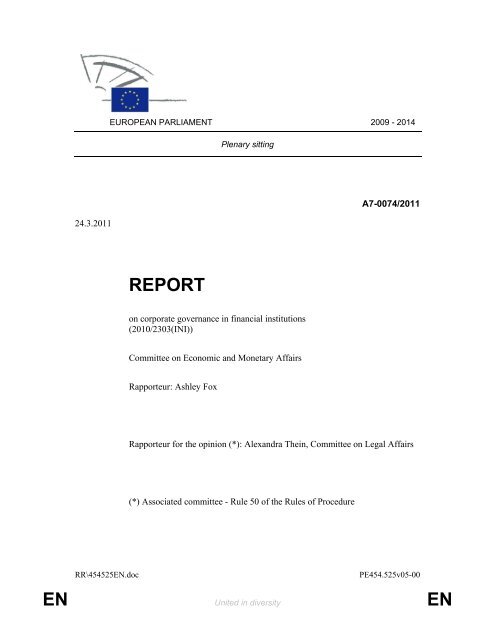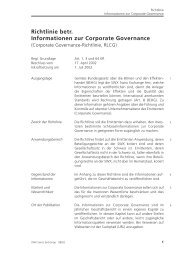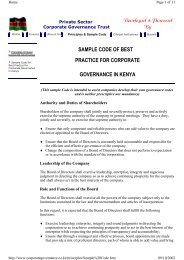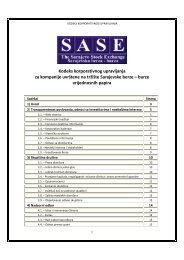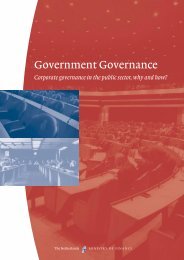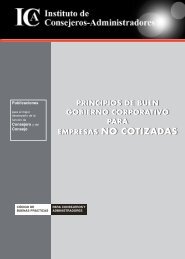EN EN REPORT - European Corporate Governance Institute
EN EN REPORT - European Corporate Governance Institute
EN EN REPORT - European Corporate Governance Institute
Create successful ePaper yourself
Turn your PDF publications into a flip-book with our unique Google optimized e-Paper software.
EUROPEAN PARLIAM<strong>EN</strong>T 2009 - 2014Plenary sitting24.3.2011A7-0074/2011<strong>REPORT</strong>on corporate governance in financial institutions(2010/2303(INI))Committee on Economic and Monetary AffairsRapporteur: Ashley FoxRapporteur for the opinion (*): Alexandra Thein, Committee on Legal Affairs(*) Associated committee - Rule 50 of the Rules of ProcedureRR\454525<strong>EN</strong>.docPE454.525v05-00<strong>EN</strong> United in diversity <strong>EN</strong>
PR_INICONT<strong>EN</strong>TSPageMOTION FOR A EUROPEAN PARLIAM<strong>EN</strong>T RESOLUTION............................................ 3OPINION OF THE COMMITTEE ON LEGAL AFFAIRS ................................................... 11OPINION OF THE COMMITTEE ON THE INTERNAL MARKET AND CONSUMERPROTECTION......................................................................................................................... 17RESULT OF FINAL VOTE IN COMMITTEE ...................................................................... 21<strong>EN</strong>PE454.525v05-00 2/21 RR\454525<strong>EN</strong>.doc
MOTION FOR A EUROPEAN PARLIAM<strong>EN</strong>T RESOLUTIONon corporate governance in financial institutions(2010/2303(INI))The <strong>European</strong> Parliament,– having regard to Rule 48 of its Rules of Procedure,– having regard to Directive 2010/76/EU of the <strong>European</strong> Parliament and of the Council of24 November 2010 amending Directives 2006/48/EC and 2006/49/EC as regards capitalrequirements for the trading book and for re-securitisations, and the supervisory review ofremuneration policies 1 ,– having regard to the report of the Committee on Economic and Monetary Affairs and theopinions of the Committee on Legal Affairs and of the Committee on the Internal Marketand Consumer Protection (A7-0074/2011),Approach1. Welcomes the Commission’s Green Paper and the opportunity to improve corporategovernance structures throughout the EU;2. Emphasises that the proper functioning of the internal market depends on the stability ofthe financial system and, related to this, on the trust put by <strong>European</strong> citizens andconsumers in financial institutions and transactions; notes that the remuneration systemsused to date have led to inappropriate structures;3. Is aware that in the wake of the financial crisis it has become clear that the quality ofconsumer protection and safeguards in the financial services sector requires tangible andstrong improvement, particularly as regards the monitoring and supervisory aspects;4. Believes that the financial sector should meet the needs of the real economy, help topromote sustainable growth and display the greatest possible degree of socialresponsibility;5. Notes that during the recent financial crisis many financial institutions around the worldfailed at great cost to the taxpayer; believes that the Commission is right to examine everypossible cause of failure in financial institutions in order to prevent another crisisoccurring;6. Notes a lack of values and ethics in the behaviour of some actors in financial markets andinstitutions; underlines that financial markets and institutions have to take into account, aspart of their corporate social responsibility, the interests of all parties involved, includingclients, shareholders and employees;7. Notes that the US Sarbanes-Oxley Act was ineffective in protecting US institutions during1 OJ L 329, 14.12.2010, p. 3.RR\454525<strong>EN</strong>.doc 3/21 PE454.525v05-00<strong>EN</strong>
the financial crisis, whilst at the same time increasing compliance costs for all listedcompanies, in particular SMEs, reducing competitiveness and hampering the creation ofnew listed companies; emphasises that present economic circumstances and the need forgrowth make it imperative to avoid an EU 'Sarbanes-Oxley' effect;8. Notes the diversity of corporate governance structures throughout the <strong>European</strong> Union andthe diversity of approaches that Member States take in regulating these structures;recognises that a ‘one size fits all’ approach would be inappropriate and damaging to thecompetitiveness of financial institutions; observes that national supervisors have anunderstanding of these diverse approaches and are in many instances best placed to takedecisions following EU principles; stresses nonetheless that strong minimum standards arerequired to ensure good governance across the financial sector in the EU;9. Recognises that the area of corporate governance is constantly evolving; believes that aproportionate approach combining both targeted principle-based regulations and flexible'comply or explain' codes of best practice on an equal footing is appropriate; stresses thatit must be complemented by regular external evaluation and appropriate regulatoryoversight;10. Believes that in other areas a procedure of enhanced ‘comply or explain’ with scrutinymay nevertheless be more appropriate with specific legislative requirements and moreintrusive checks into compliance or variation, and that both qualitative and quantitativeassessment is required so that compliance does not degenerate into a box-ticking exercise;11. Requests that the Commission subject every proposal it considers to improve corporategovernance to a cost-benefit impact assessment which focuses on the need to keepfinancial institutions strong, stable and competitive so that they can help deliver economicgrowth, whilst also taking into account the impact of not regulating on financial stabilityand the real economy;Risk12. Notes the failure of some financial institutions and supervisors to appreciate that thenature, scale and complexity of the risk they had incurred contributed to the financialcrisis; believes that effective risk governance is a major essential element in preventingfuture crises;13. Calls for the establishment in all financial institutions of an effective governance system,with adequate risk management, compliance, internal audit functions (and, in the case ofinsurers, actuarial functions), strategies, policies, processes and procedures;14. Stresses that risk is intrinsic and necessary in the financial sector in the interests ofproviding liquidity, fostering competitiveness and helping deliver economic growth andjobs; a thorough understanding and appreciation of risk on the part of boards is absolutelyvital in order to avoid a future financial crisis;15. Calls for the establishment of mandatory risk committees or equivalent arrangements atboard level for all economically significant financial institutions and at parent companyboard level for all economically significant financial groups; EU supervisors in<strong>EN</strong>PE454.525v05-00 4/21 RR\454525<strong>EN</strong>.doc
consultation with the relevant national authorities should establish ‘fit and proper persons’criteria and processes for senior officers and all material risk takers to be implemented bythe financial institution, and national authorities should ensure compliance with thesecriteria;16. Believes that the risk committee or other equivalent body should have responsibility foroversight and for advising the board on the current risk exposures of the financialinstitution concerned and should advise on future risk strategy, including strategy forcapital and liquidity management, taking into account financial stability assessmentsdeveloped by supervisors and national banks;17. Stresses that ultimate responsibility for risk governance lies with the board, which mustalso take responsibility for demonstrating compliance and the formulation of recoveryplans;18. Emphasises that the loyalty to the institution of members of its board constitutes a longtermand sustainable business strategy that should not allow the running of anydisproportionate risks;19. Believes that firms should establish an internal procedure, reviewed by the supervisor, toaddress conflicts which may arise between their risk management and operational units; inaddition, there should be an obligation for the board of directors to inform the supervisoryauthorities of any material risks they are aware of;20. Is in favour of establishing paths to channel information on internal conflicts orinappropriate practices in a company to the risk committee or external supervisors,recognising also that practices sometimes differ from policies and management is notalways aware of real practices;21. Points out that the communication system between the risk management function and theboard of directors should be improved by setting up a procedure for referringconflicts/problems to the hierarchy for resolution;22. Underlines that the CRO should have direct access to the board of the company; in orderto ensure his independence and objectivity is not compromised, his appointment anddismissal will be decided by the whole board;23. Suggests also that procedures should be established for recording when the risk committeeis over-ruled and the records provided to auditors and supervisors;24. Notes the Transparency Directive, which requires institutions to disclose principal risks intheir business review, and the Fourth Company Law Directive, which requires institutionsto describe their internal control systems relating to financial reporting risks; observes thatfinancial institutions should be required to disclose recovery planning and supervisoryreports thereon;25. Takes the view that it should be mandatory for financial institutions to draft an annualreport – involving as little bureaucracy as possible – on the adequacy and effectiveness oftheir internal control systems and for their board of directors to adopt that report; takes theRR\454525<strong>EN</strong>.doc 5/21 PE454.525v05-00<strong>EN</strong>
view, further, that it should likewise be mandatory for the annual report drawn up by afinancial institution’s external auditors to contain a similar assessment; stresses, however,that a ‘Sarbanes-Oxley effect’ must be avoided in the EU;26. Takes the view that closer attention should be paid to the implementation of measures toraise risk awareness in financial institutions, as increased awareness of risk at all levels ofthe institution – and amongst its employees – is a decisive factor in improving riskmanagement;27. Agrees that it is necessary to strengthen measures at EU level to prevent conflicts ofinterest in order to safeguard the objectivity and independence of judgement of boardmembers across the banking, securities and insurance sectors;Boards of directors28. Calls on EU supervisors in consultation with the relevant national authorities to developcompetence criteria for a ‘fit and proper person’ test, by which to assess the suitability ofindividuals for controlled functions, taking into account the nature, complexity and size ofthe financial institution; supervisors must perform their assessments and approvalsprocedure in a timely and efficient manner with due regard for the judgement of regulatedfirms; for major and systemically relevant financial institutions, supervisors shouldperform intrusive checks as to the fitness, expertise and diversity of directors bothindividually and collectively and their suitability in relation to the appointment, and fordirectors the wider composition of the governing body and their time commitment, takinginto account their other activities;29. Calls on the Commission to develop legislation requiring large financial institutions tosubmit their boards to regular external evaluation aimed at ensuring not only highstandards of contributions by individual directors, but also that the board as a whole andits committees are in a position to deliver on the institution's strategic objectives andmanagement of the risk; requires large financial institutions to confirm in their annualreports that they have undertaken such an evaluation, the name of the external evaluator, adescription of the scope of the evaluation and that they have acted on the latter’srecommendations; calls on ESMA to develop guidance on the scope of such evaluations inconsultation with the industry, shareholders and regulators;30. Suggests that financial institutions may voluntarily opt for an evaluation of thefunctioning of the board of directors, carried out by an external evaluator;31. Believes the role of the CEO and Chairman should be separated, but notes that there arecircumstances when a combined role could be necessary in the short term; emphasisesalso that corporate management and remuneration policies must comply with and fosterthe principles of wage parity and equal treatment of women and men established by theTreaties and by EU directives;32. Believes that all members of unitary or supervisory boards should possess recent andrelevant professional qualifications, knowledge and experience, including financial, forjointly piloting the financial undertaking; requires all economically significant financialinstitutions to have non-executive board members; believes, however, that every financial<strong>EN</strong>PE454.525v05-00 6/21 RR\454525<strong>EN</strong>.doc
institution should have a board with a diversity of experience, expertise and character soas to provide sound and prudent management and that appointments should be made onmerit;33. Emphasises that greater diversity among the members of boards of directors will reducethe financial sector’s vulnerability to crises and contribute to economic stability; calls onthe Commission to submit a plan to bring about phased increases in gender diversity withthe aim of achieving at least 40% representation for each gender on the boards of directorsof financial institutions, to ensure that this target is met within a foreseeable period and toconsider measures to strengthen diversity in terms of professional, social and culturalbackground;34. Emphasises that greater diversity among the members of boards is likely to improve thequality of debate and decision-making;35. Emphasises the importance of employee representatives being on the board of directors, inparticular in view of their long-term interest in the sustainable management of theinstitution and because of their experience and knowledge of its internal structures;36. Considers that publicly owned financial institutions and financial authorities must ensureopen and independent appointment processes;37. Stresses that directors must devote sufficient time to the performance of their duties, theguidelines for which should be developed by EU supervisory bodies and be monitored bythe board and national supervisory bodies;38. Believes that there should be a presumption against any person serving on an excessivenumber of boards of directors of different financial groups;39. Calls for efficient implementation of the rules on consultation and employee participationsystems opted for in the context of Directive 2001/86/EC supplementing the Statute for a<strong>European</strong> Company;40. Is of the opinion that both senior management and the board of directors should beactually and personally accountable and liable for the setting up and application ofcorporate governance principles at all levels of the company/corporation;41. Regards a clearly defined <strong>European</strong> minimum standard for the accountability of themembers of the boards of directors of financial institutions as necessary;42. Notes that the <strong>European</strong> Central Bank, the <strong>European</strong> Investment Bank, the <strong>European</strong>Investment Fund and the central banks of all Member States are led by male governors;notes that only very few women are currently represented in governing positions withinthe central banks of the Member States and of the financial institutions;43. Believes that directors should have a general duty of care and be obliged to report materialrisks to supervisors;44. Invites the Commission and Member States to take gender-balanced measures as regardsRR\454525<strong>EN</strong>.doc 7/21 PE454.525v05-00<strong>EN</strong>
the appointment of governors within the financial institutions and bodies of the <strong>European</strong>Union;45. Encourages the Commission to promote policies which can help companies in thefinancial sector in today's economic environment to value and manage a more balancedrepresentation of men and women in the decision-making bodies;46. Emphasises that corporate management and remuneration policies must comply with andfoster the principles of wage parity and equal treatment of women and men established bythe Treaties and by EU directives;Remuneration47. Believes that remuneration policies must be based on the long-term performance of theindividual and their firm to ensure remuneration policies do not contribute to excessiverisk-taking, and that remuneration policies or payments should never undermine thestability of a firm;48. Welcomes the changes to remuneration policy that have already been introduced byfinancial institutions, whereby bonuses are linked to the long-term success of the businessand only paid out after three years at the earliest; also welcomes the fact that it is possibleto demand repayment of bonuses if economic objectives have not been met;49. Stresses that all share options must be properly disclosed and have vesting periods of atleast three years; considers that greater use should be made of contingent capitalinstruments rather than shares, as they have less conflict of interest in inducing shorttermism;50. Notes that the issue of remuneration in financial institutions has been dealt with inCRD III;51. Stresses the importance of a strict remuneration policy as foreseen in the CapitalRequirements Directive (CRD III) and Solvency II; expects these and other existinglegislative measures to be rapidly implemented from January 2011; calls upon theCommission to publish an evaluation report in 2014;52. Acknowledges that structural approaches differ among Member States; encouragespractices which strengthen corporate governance according to the legal form, size, nature,complexity and business model of the financial institution;53. Notes that the application of existing recommendations for the remuneration of directorsof listed companies is neither uniform nor satisfactory; calls therefore on the Commissionto come forward with legislation at EU level on remuneration for directors of listedcompanies in order to ensure that the structure of remuneration in listed companies doesnot encourage excessive risk-taking, as well as to ensure a level playing field in the EU;54. Highlights in particular concerns that shareholders cannot and do not currently exercisedue control over remuneration policies in financial institutions;<strong>EN</strong>PE454.525v05-00 8/21 RR\454525<strong>EN</strong>.doc
55. Insists that full transparency is necessary for shareholders to be able to conduct properoversight of remuneration policies, and calls in particular for the publication of thenumber of staff in each institution receiving total remuneration greater than EUR 500 000,in bands of at least EUR 500 000;56. Is of the opinion that shareholders should help determine sustainable remunerationpolicies and should be given the opportunity to express their views on the remunerationpolicies, with the right to reject the remuneration policy defined by the remunerationcommittee at the general meeting;Supervisors, auditors and institutions57. Believes that an enhanced three-way dialogue between supervisors, auditors (both internaland external) and institutions would improve the likelihood of substantial or systemic riskbeing detected at an early stage; encourages supervisors, the <strong>European</strong> Systemic RiskBoard, auditors and institutions to engage in open discussions and to increase thefrequency of meetings in order to facilitate prudential supervision; further recommendsthat bilateral meetings take place between auditors and supervisors of major financialinstitutions; believes that it is the board and Internal Auditor's responsibility to ensure thatnecessary internal controls are in place to detect systemic risks and to establish aprocedure for informing the board and supervisors of these risks in order to avoid negativeconsequences;58. Stresses that the primary role of auditors should not be unduly compromised by theburden of extra duties, such as an examination and assessment of non-audit informationthat falls outside their area of expertise; believes auditors should report directly tosupervisors when aware of something of material concern to supervision and shouldparticipate in pan-industry assessments of specific controls;59. Insists that public authorities, including ESAs and national supervisors, must adhere tohigh standards of independence and corporate governance equivalents;Shareholders and the AGM60. Encourages institutional shareholders to take a more active role in holding the board andits strategy to account in an appropriate way and to reflect the long-term interests of theirbeneficiaries;61. Calls for legislation requiring all those authorised to manage investments on behalf ofthird parties in the EU to state publicly whether or not they apply and disclose against astewardship code; if so, which one and why, and if not why not;62. Believes that significant transactions above a defined and proportionate size shouldrequire specific shareholder approval or be subject to an obligation to inform shareholdersbefore the transaction can take effect, provided that involvement of the shareholders isfeasible, the principle of confidentiality is met and the daily business of the financialinstitution is not undermined; ESMA may issue guidelines concerning the appropriatebenchmark in consultation with the relevant national authorities;RR\454525<strong>EN</strong>.doc 9/21 PE454.525v05-00<strong>EN</strong>
63. Recognises that transparency is necessary with regard to related party transactions andthat significant transactions which involve a related party should be notified to the listingauthority and be accompanied by a letter from an independent adviser confirming that thetransaction is fair and reasonable, or should be subject to a vote of shareholders with therelated party being excluded from this vote; ESMA may issue guidelines concerning theappropriate benchmark in consultation with the relevant national authorities;64. Calls for mandatory annual elections of each member of the board, for mandatory annualrequests for approval of the board's policy or for discharge of the board at the AGM, witha view to making the board more accountable and encouraging a culture of greaterresponsibility;65. Calls for an investigation of the inhibition on effective shareholder controls and for theremoval of regulatory impediments to reasonable collaboration;66. Calls for an electronic vote to be introduced in order to encourage shareholders to engagein the corporate governance of financial institutions;67. Takes the view that all limited partnerships should be free to stipulate in their statuteswhether their partners may remain anonymous or must be named and that, in the lattercase, a law must be enacted to guarantee that their identities are in fact made public;68. Instructs its President to forward this resolution to the Council and the Commission.<strong>EN</strong>PE454.525v05-00 10/21 RR\454525<strong>EN</strong>.doc
1.3.2011OPINION OF THE COMMITTEE ON LEGAL AFFAIRSfor the Committee on Economic and Monetary Affairson <strong>Corporate</strong> governance in financial institutions(2010/2303(INI))Rapporteur(*): Alexandra Thein(*) Associated committee – Rule 50 of the Rules of ProcedureBackgroundSHORT JUSTIFICATIONThe aim of the Green Paper under consideration here is to draw conclusions from the globalfinancial crisis triggered by the bankruptcy of the Lehman Brothers bank in autumn 2008following the inappropriate securitisation of US subprime mortgages. In the light of thedevelopment of new financial instruments in a globalised world, the Green Paper takes acritical look at the soundness of financial institutions and of the financial system as a whole,and at the regulation and supervision of the system, with a view to preventing any repeat ofthe crisis in the future. The Commission regards the strengthening of corporate governance ascentral to its financial market reform and crisis prevention programme. In that connection, theCommission notes in particular that in the financial services sector corporate governance musttake account of the interests of other stakeholders (depositors, savers, life insurance policyholders, etc.) and of the stability of the financial system, owing to the systemic nature of manyof the players involved.The options outlined in the Green Paper are intended to accompany and supplement the legalprovisions implemented or planned for the purpose of strengthening the financial system, inparticular in the context of the reform of the <strong>European</strong> supervisory architecture, the CapitalRequirements Directive (CRD III), the Solvency II Directive for insurance companies, thereform of the UCITS system and the regulation of Alternative Investment Fund Managers(AIFM). The Green Paper focuses on a narrow definition of corporate governance whichincorporates the role of external auditors. Important, further-reaching aspects of governance –such as the separation of roles within financial undertakings, the internal audit function andaccounting independence – are not dealt with.RR\454525<strong>EN</strong>.doc 11/21 PE454.525v05-00<strong>EN</strong>
Rapporteur’s standpointFinancial risk-taking is a quintessential aspect of the financial sector and fundamental to itssuccess in business terms and to the functions it performs for the economy as a whole. It is inthe public interest that these functions should not be restricted to a degree beyond that neededto prevent systemic crisis. To illustrate this point further, it must be possible for a financialinstitution to opt for orderly bankruptcy, provided that this does not pose a systemic risk andwould not lead to a domino effect on the market as a result of interdependencies within thefinancial system.Your rapporteur regards the development of a more comprehensive system and culture ofsustainable risk management and risk monitoring in financial institutions as a key task.This challenge, as important as it is complex, can be met by means of a package of measureswhich will have either a direct or indirect impact. Many of the measures concerned werealready taken last year at <strong>European</strong> and Member State level, in particular in the area ofmanagement remuneration. In addition, academic studies suggest that measures toprofessionalise boards of directors and ensure that their members come from very diversebackgrounds would be both well advised and likely to bring about improvements. Theaccountability and liability of members of boards of directors must be clearly defined, butcare must be taken when determining precisely what form that accountability and liabilityshould take, in order not to jeopardise financial institutions’ willingness to seize businessopportunities, a desirable aspect of their work, or the quality of board members.Your rapporteur regards the elimination, or at least the attenuation, of the impact which allissues relating to conflicts of interest have as contributory factors in financial crises as afurther key task.As regards the conflicts between the twin roles of financial institutions as providers of creditand investment banks, a mandatory legal requirement that individual financial institutionsshould be allowed to perform only one of these roles is worthy of consideration, but would inpractice be unfeasible, given the potential losses of efficiency and the need for the <strong>European</strong>financial sector to remain globally competitive. What certainly are needed, however, areuncompromising measures to rule out conflicts of interest involving the individuals who playa decisive role in risk supervision, namely the members of boards of directors.The UK’s Stewardship Code can be regarded as a suitable model for a uniform EU code forinstitutional investors.SUGGESTIONSThe Committee on Legal Affairs calls on the Committee on Economic and Monetary Affairs,as the committee responsible, to incorporate the following suggestions in its motion for aresolution:1. Takes the view that the number of boards on which directors of financial institutions may<strong>EN</strong>PE454.525v05-00 12/21 RR\454525<strong>EN</strong>.doc
sit at the same time should be limited to three, in which connection membership of theboards of several companies within the same financial group should count as onedirectorship; this limitation should not be applied to the member who is the owner of atleast one fifth of the share capital of the financial institution;2. Emphasises that greater diversity among the members of boards of directors will reducethe financial sector’s vulnerability to crises and contribute to economic stability; calls onthe Commission to submit a plan to bring about phased increases in gender diversity withthe aim of achieving at least 40% representation for each gender on the boards of directorsof financial institutions, to ensure that this target is met within a foreseeable period and toconsider measures to strengthen diversity in terms of professional, social and culturalbackground;3. Emphasises the importance of employee representatives being on the board of directors, inparticular in view of their long-term interest in the sustainable management of theinstitution and because of their experience and knowledge of its internal structures;4. Emphasises that greater diversity among the members of boards is likely to improve thequality of debate and decision-making;5. Points out that there should be a presumption in financial institutions that the functions ofchairman of the board of directors and chief executive officer be separate, though theremay be occasions where combining the two functions is necessary as a short-termmeasure;6. Suggests that financial institutions may voluntarily opt for an evaluation of thefunctioning of the board of directors, carried out by an external evaluator;7. Believes that making it compulsory for one or more members of the audit committee to bepart of the risk committee and vice versa could lead to a dissolution of competence andlack of focus on just one job;8. Emphasises that the loyalty to the institution of members of its board constitutes along-term and sustainable business strategy that should not allow the running of anydisproportionate risks;9. Notes that the chairman of the risk committee should report to the general meeting, or inany event that he/she should not be able to be fired by the Executive or the board ofdirectors;10. Takes the view that it should be mandatory for financial institutions to draft an annualreport – involving as little bureaucracy as possible – on the adequacy and effectiveness oftheir internal control systems and for their board of directors to adopt that report; takes theview, further, that it should likewise be mandatory for the annual report drawn up by afinancial institution’s external auditors to contain a similar assessment; stresses, however,that a ‘Sarbanes-Oxley effect’ must be avoided in the EU;11. Takes the view that a high-performance IT infrastructure guaranteeing the rapid flow ofinformation on risk right up to board-of-directors level is important; considers that theRR\454525<strong>EN</strong>.doc 13/21 PE454.525v05-00<strong>EN</strong>
decision on implementing technical measures to improve the quality and speed oftransmission of information to the board of directors should be left to the financialinstitutions, and thus to the board of directors thereof, so as to allow arrangements to bemade that are tailored to each institution and to its specific requirements;12. Takes the view that closer attention should be paid to the implementation of measures toraise risk awareness in financial institutions, as increased awareness of risk at all levels ofthe institution – and amongst its employees – is a decisive factor in improving riskmanagement;13. Is in favour of establishing paths to channel information on internal conflicts orinappropriate practices in a company to the risk committee or external supervisors, alsorecognising that practices sometimes differ from policies, and management is not alwaysaware of real practices;14. Takes the view that chief risk officers should have the same status in a financial institutionas the chief financial officer and should be able to report directly to the board; considersthat a risk committee should be established at board level to deal with risk issues andmonitor correct implementation of the risk strategy throughout the financial institution;calls for the introduction of <strong>European</strong> standards governing the qualifications of chief riskofficers and members of risk committees, with a view to enhancing their status withinfinancial institutions;15. Points out that the communication system between the risk management function and theboard of directors should be improved by setting up a procedure for referringconflicts/problems to the hierarchy for resolution;16. Takes the view that the external auditors in financial institutions should be required toinform the board of directors and the competent supervisory bodies immediately if theiraudit brings to light facts which could jeopardise the future of the institution or seriouslyhamper its development or which point to a serious breach of the licensing requirementsor the rules governing the performance of duties;17. Does not regard it as appropriate to require investors to make public the details of actualor alleged voting strategies in annual general meetings;18. Takes the view that institutional investors should be required formally and publicly toexplain any actions which breach the uniform EU code for institutional investors (‘complyor explain’), which needs to be established; points out, however, that such breaches areoften not explained or explained only inadequately, and that in such cases complianceshould be enforced by means of sanctions;19. Takes the view that the identification of shareholders should be facilitated in order toencourage dialogue between companies and their shareholders and to reduce the risk ofabuse connected to ‘empty voting’;20. Calls for the establishment of the electronic vote in order to encourage shareholders toengage in financial institutions’ corporate governance;<strong>EN</strong>PE454.525v05-00 14/21 RR\454525<strong>EN</strong>.doc
21. Takes the view that all limited partnerships should be free to stipulate in their statuteswhether their partners may remain anonymous or must be named and that, in the lattercase, a law must be enacted to guarantee that their identities are in fact made public;22. Regards a clearly defined <strong>European</strong> minimum standard for the accountability of themembers of the boards of directors of financial institutions as necessary;23. Draws attention, with reference to remuneration and remuneration policies in financialinstitutions, to the legislative action which has already been taken, in particular the EUCapital Requirement Directive (CRD III), which came into force on 1 January 2011, andthe Directive on the taking-up and pursuit of the business of insurance and reinsurance(Solvency II); calls on all Member States to implement this legislation with oversight fromthe Commission and the <strong>European</strong> Supervisory Authorities and recommends that the nextstep should be to assess their effectiveness; takes the view that the level and compositionof the components of remuneration have to be linked to sustainable and long-termcommercial success;24. Notes that during discussions on CRD III the Commission and Council agreed that furtherproposals raised by the <strong>European</strong> Parliament should be addressed as part of the corporategovernance package, and highlights in particular Parliament’s concern that shareholderscurrently cannot and do not exercise due control over remuneration policies in financialinstitutions;25. Insists that full transparency is necessary for shareholders to be able to conduct properoversight of remuneration policies, including the publication of the number of staffreceiving more than EUR 500 000, in bands of at least EUR 500 000;26. Takes the view that members of the board of directors should be strictly prohibited fromengaging in any other form of business dealings, in particular consultancies, with thefinancial concern in question; external auditors should be prohibited from obtaining anypayment – other than their fees for the audit they perform – from the financial institutionfor a service which would be a breach of applicable independence or other ethicsrequirements;27. Takes the view that details of a conflict of interest policy covering the various areas ofbanking activity should form a mandatory part of the annual report of financial institutionsand calls for consideration to be given to developing a corresponding EU code of conduct;28. Takes the view that, while taking into account the different existing legal and economicmodels, it is necessary to harmonise the content and detail of Community rules onconflicts of interest in order to ensure that the various kinds of financial institutions aresubject to similar rules, under which they must apply the provisions of MiFID, the CRD,the UCITS Directive or Solvency II.RR\454525<strong>EN</strong>.doc 15/21 PE454.525v05-00<strong>EN</strong>
RESULT OF FINAL VOTE IN COMMITTEEDate adopted 28.2.2011Result of final vote +:–:0:Members present for the final voteSubstitute(s) present for the final vote1900Raffaele Baldassarre, Sebastian Valentin Bodu, Françoise Castex,Christian Engström, Klaus-Heiner Lehne, Antonio Masip Hidalgo,Alajos Mészáros, Bernhard Rapkay, Evelyn Regner, Francesco EnricoSperoni, Alexandra Thein, Cecilia Wikström, Zbigniew Ziobro,Tadeusz ZwiefkaPiotr Borys, Sergio Gaetano Cofferati, Sajjad Karim, EvaLichtenberger, Toine Manders<strong>EN</strong>PE454.525v05-00 16/21 RR\454525<strong>EN</strong>.doc
1.3.2011OPINION OF THE COMMITTEE ON THE INTERNAL MARKET AND CONSUMERPROTECTIONfor the Committee on Economic and Monetary Affairson corporate governance in financial institutions(2010/2303(INI))Rapporteur: Othmar KarasSUGGESTIONSThe Committee on the Internal Market and Consumer Protection calls on the Committee onEconomic and Monetary Affairs, as the committee responsible, to incorporate the followingsuggestions in its motion for a resolution:1. Emphasises that the proper functioning of the internal market depends on the stability ofthe financial system and, related to this, on the trust put by <strong>European</strong> citizens andconsumers in financial institutions and transactions; notes that the remuneration systemsused to date have led to inappropriate structures;2. Recognises that the financial crisis has revealed the lack of effectiveness of existingcorporate governance principles based on a ‘comply or explain’ approach; believes thatpracticable, legally binding corporate governance provisions are needed;3. Is aware that in the wake of the financial crisis it has become clear that the quality ofconsumer protection and safeguards in the financial services sector requires tangible andstrong improvement, particularly as regards the monitoring and supervisory aspects;4. Stresses, in view of the fact that the financial sector, because of its particular role in theeconomy and its general social responsibility, also has a particular responsibility forserious, sustainable business strategies and must therefore be appropriately remunerated,that bonus payments should encourage long-term performance and discourage short-termthinking in order to prevent risky business practices;5. Believes that the financial sector should meet the needs of the real economy, help topromote sustainable growth and display the greatest possible degree of socialRR\454525<strong>EN</strong>.doc 17/21 PE454.525v05-00<strong>EN</strong>
esponsibility;6. Supports the Commission’s aim of changing the remuneration policy of financialinstitutions with a view to restraining excessive risk-taking,7. Acknowledges that structural approaches differ among Member States; encouragespractices which strengthen corporate governance according to the legal form, size, nature,complexity and business model of the financial institution;8. Stresses that a well-governed company should be accountable and transparent to itsemployees, its shareholders and other stakeholders; reaffirms that directors of financialinstitutions have to take account of their institution’s, as well as of consumers’ andemployees’, long-term interests when taking decisions, in order to minimise risks; this canbe accomplished by a legislative requirement for every regulated financial institution inthe <strong>European</strong> Union to describe its business model in its annual report with an explanationof the board’s risk appetite and its understanding of the risk inherent in delivery of thebusiness model; the report should further include a description of the steps the board hastaken to ensure that these risks are overseen and managed, and of how remunerationpolicy is aligned to the delivery of the business model and the management by executivesof the risk involved;9. Emphasises that corporate management and remuneration policies must comply with andfoster the principles of wage parity and equal treatment of women and men established bythe Treaties and by EU directives;10. Agrees that it is necessary to strengthen measures at EU level to prevent conflicts ofinterest in order to safeguard the objectivity and independence of judgement of boardmembers across the banking, securities and insurance sectors;11. Is of the opinion that both senior management and the board of directors should beactually and personally accountable and liable for the setting up and application ofcorporate governance principles at all levels of the company/corporation;12. Stresses that risk is intrinsic and necessary in the financial sector in the interests ofproviding liquidity, fostering competitiveness and helping deliver economic growth andjobs; a thorough understanding and appreciation of risk on the part of boards is absolutelyvital in order to avoid a future financial crisis;13. Welcomes the changes to remuneration policy that have already been introduced byfinancial institutions, whereby bonuses are linked to the long-term success of the businessand only paid out after three years at the earliest; also welcomes the fact that it is possibleto demand repayment of bonuses if economic objectives have not been met;14. Calls upon the Commission to propose legislation concerning mandatory board riskcommittees or equivalent arrangements, and rules on their composition and function; takesthe view that members of risk committees should devote enough time to this duty to be ina position to assess properly the risks associated with complex financial instruments;15. Urges the Commission to propose sector-specific amendments to financial services<strong>EN</strong>PE454.525v05-00 18/21 RR\454525<strong>EN</strong>.doc
legislation in order to ensure consistency between banking and non-banking institutions inremuneration policy; furthermore, calls on the Commission to bring forward legislativeproposals in the field of company law to help address corporate governance issues andensure consistency in remuneration policy for all types of companies;16. Encourages institutional shareholders to engage in a dialogue with financial institutions onimproving corporate governance and risk management with a view to the long-termviability of the financial institution; believes that ‘comply or explain’ approaches in theform of guidelines have failed as a useful means of avoiding financial crises and haveproved to be ineffective, and that binding rules need to be at the core of corporategovernance regulation, complemented by soft regulation such as an international code ofbest practice;17. Stresses the importance of a strict remuneration policy as foreseen in the CapitalRequirements Directive (CRD III) 1 and Solvency II; and expects these and other existinglegislative measures to be rapidly implemented from January 2011; calls upon theCommission to publish an evaluation report in 2014;18. Calls upon Member States to put in place specific initiatives to ensure betterrepresentation of women on boards of directors;19. Calls for efficient implementation of the rules on consultation and employee participationsystems opted for in the context of Directive 2001/86/EC 2 supplementing the Statute for a<strong>European</strong> Company.1 Directive 2010/76/EU, OJ L 329, 14.12.2010, p. 3.2 OJ L 294, 10.11.2001, p. 22RR\454525<strong>EN</strong>.doc 19/21 PE454.525v05-00<strong>EN</strong>
RESULT OF FINAL VOTE IN COMMITTEEDate adopted 28.2.2011Result of final vote +:–:0:Members present for the final voteSubstitute(s) present for the final vote3000Pablo Arias Echeverría, Cristian Silviu Buşoi, Anna Maria CorazzaBildt, António Fernando Correia De Campos, Jürgen Creutzmann,Christian Engström, Louis Grech, Małgorzata Handzlik, PhilippeJuvin, Eija-Riitta Korhola, Mitro Repo, Robert Rochefort, ZuzanaRoithová, Heide Rühle, Christel Schaldemose, Andreas Schwab,Catherine Stihler, Kyriacos Triantaphyllides, Bernadette Vergnaud,Barbara WeilerDamien Abad, Cornelis de Jong, María Irigoyen Pérez, Constance LeGrip, Emma McClarkin, Antonyia Parvanova, Konstantinos Poupakis,Sylvana Rapti, Olga Sehnalová, Wim van de Camp<strong>EN</strong>PE454.525v05-00 20/21 RR\454525<strong>EN</strong>.doc
RESULT OF FINAL VOTE IN COMMITTEEDate adopted 16.3.2011Result of final vote +:–:0:Members present for the final voteSubstitute(s) present for the final voteSubstitute(s) under Rule 187(2) presentfor the final vote3732Burkhard Balz, Sharon Bowles, Udo Bullmann, Pascal Canfin,Nikolaos Chountis, George Sabin Cutaş, Rachida Dati, LeonardoDomenici, Derk Jan Eppink, Diogo Feio, Vicky Ford, Ildikó Gáll-Pelcz, José Manuel García-Margallo y Marfil, Jean-Paul Gauzès, SvenGiegold, Sylvie Goulard, Liem Hoang Ngoc, Wolf Klinz, PhilippeLamberts, Astrid Lulling, Hans-Peter Martin, Íñigo Méndez de Vigo,Ivari Padar, Antolín Sánchez Presedo, Olle Schmidt, Edward Scicluna,Peter Simon, Peter Skinner, Theodor Dumitru Stolojan, Ivo Strejček,Marianne Thyssen, Corien Wortmann-KoolSophie Auconie, Elena Băsescu, Saïd El Khadraoui, Ashley Fox,Danuta Jazłowiecka, Olle Ludvigsson, Thomas Mann, Miguel Portas,Catherine StihlerDavid Campbell BannermanRR\454525<strong>EN</strong>.doc 21/21 PE454.525v05-00<strong>EN</strong>


